Reviews
Anaparastasi
Theodoros Angelopoulos
Greece, 1970
Credits
Review by Ian Johnston
Posted on 06 November 2012
Source Artificial Eye DVD
Categories Taking Time: The Cinema of Theodoros Angelopoulos
Reconstruction, Angelopoulos’ very first feature, opens with what seems very familiar territory: a long single shot of a bleak, rain-swept mountainous landscape into which a dilapidated bus struggles to make its way. It’s a trope that practically became a cliché of Angelopoulos’ cinema with its intentional resistance to the popular image of Greece as some kind of sun-drenched paradise. Yet for all this initial familiarity Reconstruction is in fact a “case apart” in Angelopoulos’ filmography. It doesn’t offer any true signposts forward to the later films—something that his second film Days of ‘36 very clearly does. In fact, with its overt documentary impulse and its jumbled and fragmented chronology, it very much offers a stylistic path not taken by Angelopoulos.
It’s an ambitious film, one that takes a banal crime - a wife and her lover murder her husband on his visit home from working as a Gastarbeiter in West Germany - and makes it emblematic of the state of the nation. It is, in Angelopoulos’ own words, “an elegy for a land rotting away, abandoned by its inhabitants.”1 What is meant by this is made clear in the factual voice-over, spoken by Angelopoulos himself, that opens the film: the setting in the village of Tymphaia in Epirus (a mountainous region in the northwest of the country, bordering Albania); the ironic invocation of its links to the glories of Greece’s classical past, there to underline the region’s decline in modern times; the statistical details of population decline, from 1,250 in 1939 to 85 in 1965.
Angelopoulos is first addressing here the dramatic economic decline of rural Greece, accompanied and contributed to by waves of mass emigration. This was then exacerbated by the policy of the West German government in the early sixties to extend their “guest worker” (Gastarbeiter) programme to allow Greek citizens (without their families) to take up low-paid jobs, with the inevitable result of an even greater decline in the active male population. More than halfway through the film, a group of visiting journalists is confronted by the village mayor, who speaks bitterly on this theme: “What did you come to see here? Our miserable lives? Our poverty and all the fine men going away?”
A little later, a collage of voice-overs gives expression to villagers’ experience of or attraction to the experience of living in Germany, to the sickness-at-heart that is brought on by the poverty that surrounds them, and to the envy of the life, even on low wages, that can be led in Germany. This then climaxes in a vision, spoken over shots of old people walking round the village, of a depopulated, dying community:
The villages will be deserted if this migration doesn’t stop. Nowadays it’s just us old people that are left in the villages. We’re old and we’ll start dying, and the villages will be empty. And when the villages are empty, that won’t be good for the cities either.
The whole nation, then, is implicated in this rural decline; the economic and demographic devastation wrought upon the countryside is a symptom of the sickness of the country as a whole, a sickness that Angelopoulos, with his leftist sympathies, is implying should be blamed on the regime in power—whose representative in the film, the investigating magistrate,2 is, with his lack of sympathy and his assumed moral superiority, an object of criticism; indeed, in a scene at the end he’s literally attacked by Eleni, the wife under investigation for the murder of her husband. Remember that this is the Greece of the Colonels, of the right-wing military regime that was put in place by coup d’état in 1967 and which lasted through to 1974; 1970, the year Reconstruction was made, is the midway point, but a point when Greeks of Angelopoulos’ political persuasion would not have necessarily seen any end in sight. In fact, in the interview I’ve already quoted from, Angelopoulos dedicates Reconstruction to the Colonels’ opponents, those friends of his “who have already left and those who are about to”. This is the political dimension to the movement of people out of the country.
The story of Reconstruction is a straightforward one. Husband Kostas, working in West Germany, pays a visit back home to his village in Epirus and is murdered by his wife Eleni and her married lover Kostas. After trying, rather ineptly, to cover up their tracks, the couple quickly falls under suspicion and is investigated by the police without the precise details ever being clarified. At the same time the case is followed by a news/documentary team whose leader is played by Angelopoulos itself.
Given this crime story at the centre of the film’s narrative, the critical default when talking about Reconstruction is, unsurprisingly, to invoke film noir; indeed, Andrew Horton in his book on Angelopoulos3 runs a whole gamut of film references: The Maltese Falcon, The Big Sleep, Detour, Angels with Dirty Faces, Double Indemnity, Kiss Me Deadly. In fact, nothing could be further from Angelopoulos’ interests. His film is a product of sixties art cinema, of a filmmaking practice that was both politically and aesthetically oppositional to mainstream Hollywood. More than a reconstruction, Angelopoulos is offering a deconstruction of crime narrative. His refusal to portray for us the actual murder is no delaying tactic to increase narrative interest as we anticipate a climax at the end of the film when all will be revealed. Rather, that revelation will never come.
Part and parcel of this indeterminacy, this lack of a sure footing offered to the viewer are both the film’s scrambling of chronology - constantly shifting time periods and a final shot that takes us back nearly to the beginning again - and the web of “reconstructions.” These are not only the police reconstructions where Eleni and Christos are made separately to act out their versions of the murder, but also the journalists’ reconstruction of events through their observations and interviews, and, then of course, Angelopoulos’ own reconstruction through his filmmaking of his transformation of this case into his own script. Bear in mind, too, Angelopoulos’ deliberate muddying of the waters in terms of his dual roles as writer-director of the film and journalist-investigator within the film (as the latter, he’s no more successful than the authorities).
Angelopoulos keeps the transitions between one level of reconstruction and another deliberately ambiguous; it’s often some way into a new reconstruction or flashback before we realise that the time has changed either forward or back into time, that this is no longer a continuation of the previous scene. Likewise, narrative voice is unclear, where a sequence can be introduced by Christos’ voiceover but then shifts perspective to that of Eleni: whose flashback is it then? There’s even a fascinating series of brief scenes leading up to Eleni’s confession to her brother Giorgios, scenes that don’t seem to form a coherent narrative but rather give the sense of Eleni - or Angelopoulos - trying out alternatives.
For all this structural uncertainty (which, in itself, provides a fascinating texture to the film) Angelopoulos makes two aspects abundantly clear. On the one hand, there is the smug arrogance and blindness of the investigating magistrate as he limits blame in the case to “the lascivious temperament of the accused wife” adding, “Anyway, we are dealing with people devoid of moral fibre.” (Blaming Eleni is a line that Christos also adopts, both in his interrogation and to her face.) On the other hand, there is Eleni’s growing resistance which climaxes when she both literally attacks the magistrate and simply refuses to play the “game” of reconstruction anymore.
In this sense, when Angelopoulos returns in his final shot to the crime but refuses to enter the house to reveal what is taking place within, it is an act of solidarity with Elena, joining in with her refusal and her silence. The circular route the film’s narrative takes here is a final acknowledgement of the grim fate of this couple, of rural life, and of the nation itself.
- Florian Hopf, “An Elegy for a Land Rotting Away: Reconstruction,” in Dan Fainaru, ed. Theo Angelopoulos: Interviews, Jackson: University Press of Mississippi, 2001, p. 4. ↩
- Andrew Horton calls him a detective. The character is neither named nor is his status identified. ↩
- The only monograph to have been published in English: The Films of Theo Angelopoulos: A Cinema of Contemplation, Princeton, N.J.: Princeton University Press, 1997. ↩
More Taking Time: The Cinema of Theodoros Angelopoulos
-
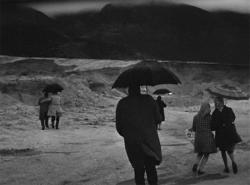
Reconstruction
1970 -
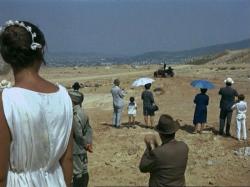
Days of ‘36
1972 -
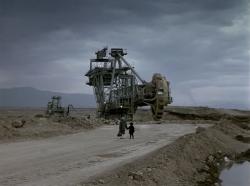
Landscape in the Mist
1988 -
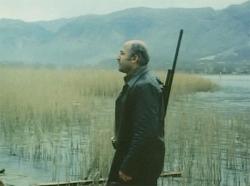
The Hunters
1977 -
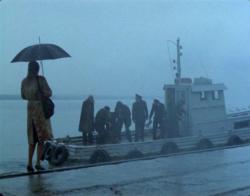
Voyage to Cythera
1983
We don’t do comments anymore, but you may contact us here or find us on Twitter or Facebook.



